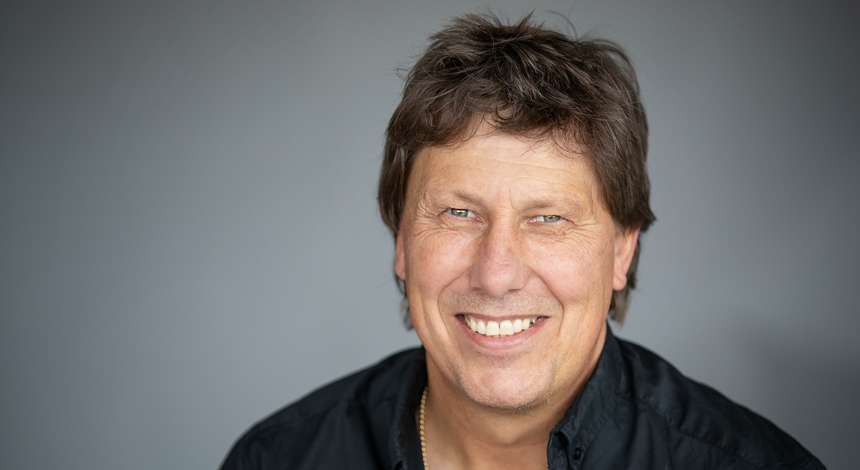
I. 10 Moments I'll never forget
3 April 1981: The first contract
Back then, there was a glass case to the right of the main stand at the Ulrich Haberland Stadium, the so-called ‘Aquarium’. I signed my first contract, which came into effect on 1 July 1981, in one of the offices below. Besides me, the former general manager Heinz Heitmann was in the room. I was the first youth player to join the club from further afield than a radius of 100 kilometres around Leverkusen – and I was scared stiff. As a mummy's boy I hadn't had to bother about anything up to then. Now having to stand on my own two feet at the age of 18 actually scared me.
4 January 1982: In at the deep end
In the first few months I flew to Leverkusen only at the weekends for Reserve games because I was still studying for my Abitur in Berlin. I stayed in the Hotel Kürten from Fridays to Sundays. Our minder Matthias Valentin lived very close by and he looked after me a lot at the start. He told me about an available flat just around the corner at Saarstraße 25 in Schlebusch. Three rooms, a bit more than 70 square metres for around 700 Deutschmarks. Bayer gave me an interest free loan so I could buy myself a kitchen. I didn't know about anything and I didn't know the cost of living on your own. It was a case of diving in at the deep end.
13 August 1983: Bundesliga debut
I actually achieved all my targets with this game. I wanted to play in the Germany youth team and it was always my dream to play at a big stadium in front of lots of spectators in the Bundesliga. Of course, it was great that it should be the Olympic Stadium in Munich. But I do think it was my most uncertain appearance of all. I looked more like fidgety Philip. But I was really looking forward to this match. We lost 2-1 – but it was still a big day for me.
26 April 1986: Europe at last
The first six months under Erich Ribbeck were like a dream. The coach was brilliant, training was fun, and we played relatively well. The first time we had a team where I thought we weren't that bad. Over the course of the season we moved ever closer to sixth spot. Up to then qualification for Europe was not on the agenda for Leverkusen. But now we were on the case. The game on the final matchday at Schalke on 26 April, where we needed just one point for sixth place, began with a strange own goal by Christian Schreier and then we conceded a second just before the break. But we just had a great team and ended up with a 2-2 draw – thanks to a strike by Herbert Waas and a back-heel goal by Christian Schreier.
17 September 1986: Where is Kalmar?
Being in Europe for the first time was absolutely special. After the draw we all asked: Kalmar? Where is Kalmar? And then we drove to the small Swedish city, went for a walk in the morning before the game and saw a coach of Bayer 04 fans when we went out of the hotel. I asked them: What are you doing here? (He laughs) I could hardly believe that several hundred of our supporters had made a 17-hour coach journey to watch us play in this little stadium. At that time, we definitely felt like a team: We had arrived in international football and we belonged to be there.
18 May 1988: One miracle after the next
Winning the UEFA Cup in our second season in Europe was incredible. Nobody, but nobody, thought we would do it. Yes, of course, we had a good team with a fantastic team spirit. There was nobody in the squad who hadn't played. Everybody played their part in winning the title because we constantly had injuries. But we didn't do much in the Bundesliga. If you talk about a miracle for Leverkusen then that always means making up a 3-0 deficit from our final first leg at Espanyol. But the whole season was a miracle. We were only really on top in the 5-1 win against Austria Vienna. But otherwise? We were the rank outsiders against Feyenoord and even more so against Barcelona. Then we played the champions of Germany in waiting Werder Bremen in the semi-final. We shouldn't have been able to win that either. But there was one miracle after the next in this competition with the icing on the cake in the legendary second leg of the final.
12 June 1993: Off to Berlin
We only went to Berlin to pick up the cup. We were in no doubt that we would win. The year before we were unlucky to go out on penalties in the semi-final against Mönchengladbach. Now we were facing Eintracht Frankfurt in the semi-final and we beat the would-be champions 3-0. We definitely wanted the experience of Berlin and that was evident in the team during the whole season. For me it was the second title within five years. And I saw it as a type of working my passage. I'd won the UEFA Cup, now the DFB Cup. So now, I thought, let's have a go at the league title. And that almost worked out in the next season. We were top at Christmas on matchday 22 in December 1993. Unfortunately we fared extremely badly after the winter break and ended up in third place.
17 June 1995: The beginning of the end
A 2-2 draw against Dynamo Dresden on matchday 34. Two weeks before that, Erich Ribbeck played Dirk Heinen in goal for the home game against Bayern Munich because he wanted to see him play under competitive conditions as he explained to me. Dirk looks quite uncertain in this match but then he saved a penalty from Christian Ziege when we were leading 1-0 – and at that moment it became clear to me: My time was up. I played a week later in the 3-3 draw in Cologne but in spite of that I instinctively knew the match against Dynamo Dresden would be my last game as the number one. After the final whistle I went to the fans and threw them my goalkeeping gloves, boots, shirt, shin pads and even my socks. In the end I was just standing there in my short goalkeepers shorts. It was first farewell to my fans after my 397 Bundesliga matches. I had tears in my eyes and was completely done in.
2 Mai 1998: In the 400 club
Against Hertha of all teams, the club from my hometown. After having played two games under Christoph Daum I was now able to make it 400 at home on matchday 33. We did lose 1-0 to a penalty from Rekdal but the game was academic in terms of the position in the table as we would definitely end up in third place. Nevertheless, it was a very big thing for me.
29 May 1999: One last time
In my 401st and final Bundesliga match – as with my league debut – we were up against Bayern again but this time at home at the BayArena. There was nothing to play for here too – we were certain of finishing runners-up and were again qualified for the Champions League and Bayern were already confirmed as champions. It was clear that my playing career would end after 18 years at the end of the season and that I would work with Peter Hermann as assistant and goalkeeping coach with the Reserves. Initially I wasn't in the squad for the game against Bayern. I was really angry and didn't understand the world any more. After 17 years with this club I was firmly convinced I would play again on the final matchday. After training on Friday, I went home instead of into the team hotel and had a sleepless night. On Saturday, Reiner Calmund called me up at noon: "Come to the stadium straightaway," he demanded. So I packed my things, was on the subs bench and then on 78 minutes I was able to come on in goal for Adam Matysek. So it all worked out for me in the end.
II. 10 Anecdotes hardly anyone knows
Culture shock, part 1
I have often been very directly confronted with the customs and traditions in the Rhineland. At some point in February 1982 I went from my flat on Saarstraße in Schlebusch in my car and turned off onto Berlin Straße when I saw two witches on the side of the road. A few metres on I noticed the next strange figures. "What's going on here?", I asked myself. I really felt uneasy. Then I came into the dressing room and here too: People were dressed up everywhere. I finally found out they were celebrating Women's Carnival Day and I didn't know what it was at all. I didn't know anything about carnival coming from Berlin. In that respect, I had no idea. The fifth season continues to irritate me: I can't be doing with carnival to this day – (he laughs) so I pulled down the blinds and locked the doors…
Culture shock, part 2
Another remarkable thing I don't know from Berlin. 11 November 1982 and I was still living on Saarstraße. The doorbell rang, I opened up and suddenly three small children started to sing. I'm thinking what's going on now so I let the three sing their song and then shut the door in their faces. From today's perspective, I'm really sorry about my behaviour. I'd never heard about St Martin's singing before. I saw a similar situation in an episode of Mr Bean – and I felt reminded of my faux pas.
Have you got five marks?
At some point in my first years: Dettmar Cramer didn't like our practice matches because they weren't serious enough. We played eight against eight or nine against nine across the pitch. So he made a suggestion to spice it up. "The losers pay the winners five marks each." The match ended 1-0 and in pouring rain there were knocks, kicks, tackles and battles – it was pure madness. And all that because just five marks were on the game. It was one of the best practice matches I've ever experienced. Nobody stayed up front and it went from end to end. Cramer did it again a few times later on but it never had the same effect as it did the first time.
Occupational hazard
In the Sunday training session after a 1-0 home defeat against Hamburg SV we practised one-on-one situations with the goalkeeper. Christian Schreier was bearing down on me, he put the ball past me, I dived backwards and wanted to grab it as he was about to shoot and he hit me on my little finger and ring finger. I cried out with pain. When I took off my glove I looked to my finger that was a strange angle. Tscholli said in the dressing room I should call my wife and say she can take the potatoes off the oven as I'm coming home late today. I was in shock so I didn't feel any pain at all. The operation lasted four hours. Before that, they had to cut up my favourite training shirt as they couldn't get it over my hand. Everything was broken that could be broken in the two fingers. The morning after the operation when the doctor came to see me in the room I said to him immediately: "When can I start training again?" He laughed and answered: "Definitely not in the next three months." "You can forget that," I countered. He quickly realised it wasn't worth arguing with me. So he recommended I do hand exercises with a tennis ball in addition to the physiotherapy. And so I kneaded this tennis ball nearly all day long. But that turned the three months injury lay-off into just three weeks. The two fingers operated on are still my most flexible today. As a goalkeeper you're always doing something with your hands. And most of the time I was very patient in rehab. In that respect, I was quite crazy and, as Tscholli liked to say, "a tough dog."
Fateful fan meeting
There was a DFB Cup tie against Waldhof Mannheim just before Christmas 1988. Our coach back then, Rinus Michels, had a difficult time in Leverkusen from the start. The fans didn't like him and we weren't doing that well on the pitch either. Our supporters wanted to bring a giant train ticket to the Ulrich Haberland Stadium: Leverkusen to Amsterdam, in the name of Rinus Michels. The message was clear. Reiner Calmund somehow got wind of it and called a fans meeting two days before the Round of 16 game. On that day, I bumped into him in the dressing room and he looked troubled and didn't feel well in view of the forthcoming meeting. I offered to come with him as I was still popular fans after winning the UEFA Cup final. We drove together to Kreuzbroich, a pub in Schlebusch. It wasn't a massive event, perhaps there were 20 fans there. Diagonally opposite me was Marion who became my wife a couple of years later and who I saw for the first time there and I liked her straightaway. Calli and I were able to dissuade the fans from the train ticket for Michels idea. We won the Round of 16 game 5-2 and four months later Bayer 04 finally parted company with Rinus Michels.
The cad
My wife only came to watch me once at a training session – (he laughs) and she was outraged by me and my behaviour. I really could be a nasty piece of work in training. And on that day I went a bit far with expletives. That was normal for me: If somebody nutmegged me then I promised to break their bones the next time. When Erich Ribbeck once called me "like a railway gate" because I wasn't quick enough once after 45 minutes of hard goalkeeping training so I shouted at him: "Shut your trap, you a..." Of course, that wasn't meant seriously. But I could get extremely angry, have real fits of rage and, on top of that, forget my upbringing. Anyway, my wife said to me in the evening: "I didn't recognise you and that wasn't the man I married." I even stopped training sessions twice because I was hopping mad with teammates. There were players like René Rydlewicz and Pavel Hapal, who could do lobs in shooting sessions for all I cared because they did that in matches and were able to do it. Everybody else had to fire everything at me. If somebody else started to lob then the next time it was his turn I went out of my goal and said: Shoot. As a goalkeeper you have to be able to teach your lads.
Greetings from Prince Valiant
Bröndby Stadium 1990, Round of 16 in the UEFA Cup: The weather was terrible and in the first half I often literally lost my vision – not because of the heavy rain but because my long hair was constantly hanging in front of my eyes. I didn't play well in the first 45 minutes and we were 1-0 down. When I got back to the dressing room I grabbed a pair of scissors from the physio’s bag, stood in front of the mirror and cut my hair – it was a first-class bowl haircut. I didn't look terrible but it didn't do much about the result because we let in another two goals in the second half and ended up losing 3-0. You have to say, Bröndby had a really strong team. Peter Schmeichel was in goal, the team also included Kim Christofte and Bent Christensen, the coach was Morten Olsen. They knocked out Eintracht Frankfurt in the first round and only went out to AS Roma in the semi-finals – Rudi Völler scored the winner for Roma at 2-1.
The invisible third man
Hardly anybody knows it: I was selected as the third goalkeeper for Germany for the European Championship in Sweden in 1992 but I didn’t travel. Back then only two goalkeepers went to the tournament. I received a written invitation from the German Football Association and was asked to keep fit just in case. So I trained twice a week with Peter Hermann in Leverkusen. But I didn't get a training bag or other kit from the DFB although I was told to inform the DFB of my measurements. And there was no thank you letter either as I missed my holidays. And, of course, I didn't receive a bonus as the other selected players did for finishing as runners-up. Bodo Illgner was in goal for Germany in Sweden and the number two was Andreas Köpke. And I was the invisible third man…
Stepi, the uncomprehending
Our son Jérome was born on a Monday on 8 August 1994. The first Bundesliga match of the season was two weeks later so we were still in the pre-season. We trained once on that Monday and I'd taken my wife Marion to the hospital the day before. She called me on Monday afternoon to say I could come as it was time. I told our assistant coach Peter Hermann about me not coming to training and instead I'd be driving to the hospital to be there at the birth. The next day, Stepi (Dragoslav Stepanovic, ed.) took me to one side and gave me a dressing-down: "You, it's not on for you to miss a training session because of that." I said: "Coach, do me a favour but I became a father yesterday. I wanted to be at the birth of my son." Steffi responded dryly: "That's why friends and acquaintances are there." That took the biscuit for me. I thought: "Is he mad now?" Today, players miss matches to be able to be at the birth of their children all the time. Back then Stepi held it against me that I missed a training session in the pre-season."
Burning issue
In 1994 we played away to Benfica in the quarter-finals of the European Cup Winners Cup. The Saturday before, at the derby in Cologne, I felt a bit under the weather. We flew to Lisbon on the Monday and I had a high temperature. In the hotel, Tscholli (physiotherapist Dieter Trzolek, ed.) was in the room next to mine. We even had a connecting door. Tscholli set his alarm clock at night and gave me a cold compress every hour. I don't know whether he got to sleep at all that night. I was in a delirium and was completely knackered. The next morning at light training, I dived for a ball and couldn’t get up again. I signed off with our goalkeeping coach Werner Friese and went back to bed. In the afternoon I went to the team meeting, Stepi asked me if I could play. I said: "Yes, I can play." Stepi added: "Are you sure?" – "Yes, I can play," I answered again. So I was in goal that night – the fever had gone but I don't know how I managed to survive that game. Fortunately I wasn't too busy in goal. Actually it was irresponsible of me. We drew 1-1. The next day I went to the doctor who diagnosed serious pneumonia and he gave me a sick note for the next two weeks.
Related News
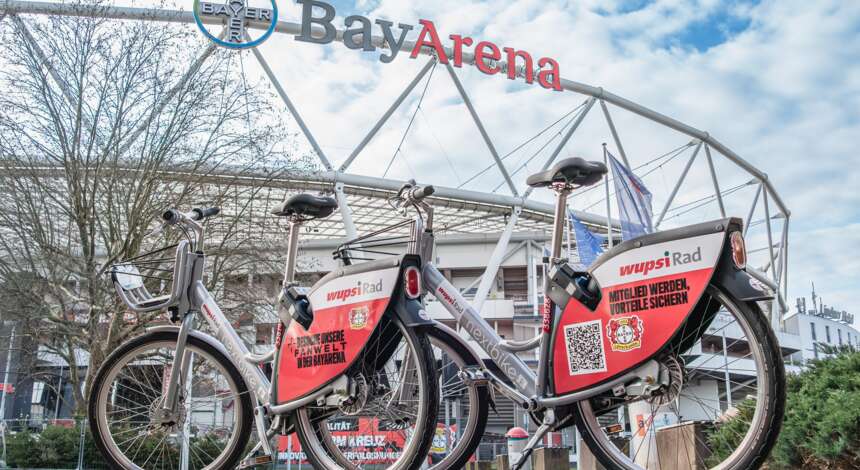
Bayer 04 and transport provider wupsi expand long-standing partnership
The long-standing successful collaboration between Bayer 04 and the transport service provider wupsi GmbH has been expanded: From January 2026, 100 wupsi bikes with Bayer 04 branding will be available for hire throughout the city of Leverkusen. They will complement the many existing offers and services that provide key support, especially for fans travelling to and from home matches at the BayArena.
Show more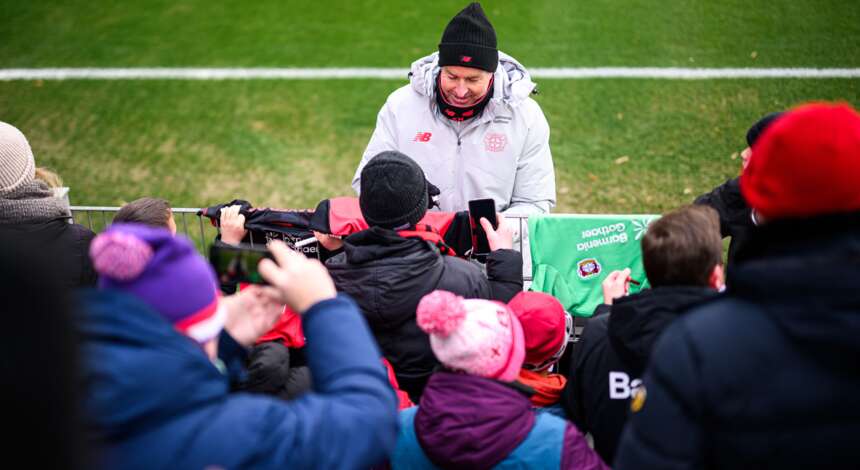
Successful start to 2026 training – Hjulmand: 'Nice to see all the fans again'
The Werkself are back! Following the two-week winter break, head coach Kasper Hjulmand's team began the new year with an open session on Sunday. After Robert Andrich and his teammates arrived in Leverkusen yesterday for the official check-in, they got back down to business a day later in front of around 1,200 fans at the Ulrich Haberland Stadion. The report from the Werkself's first session of 2026.
Show more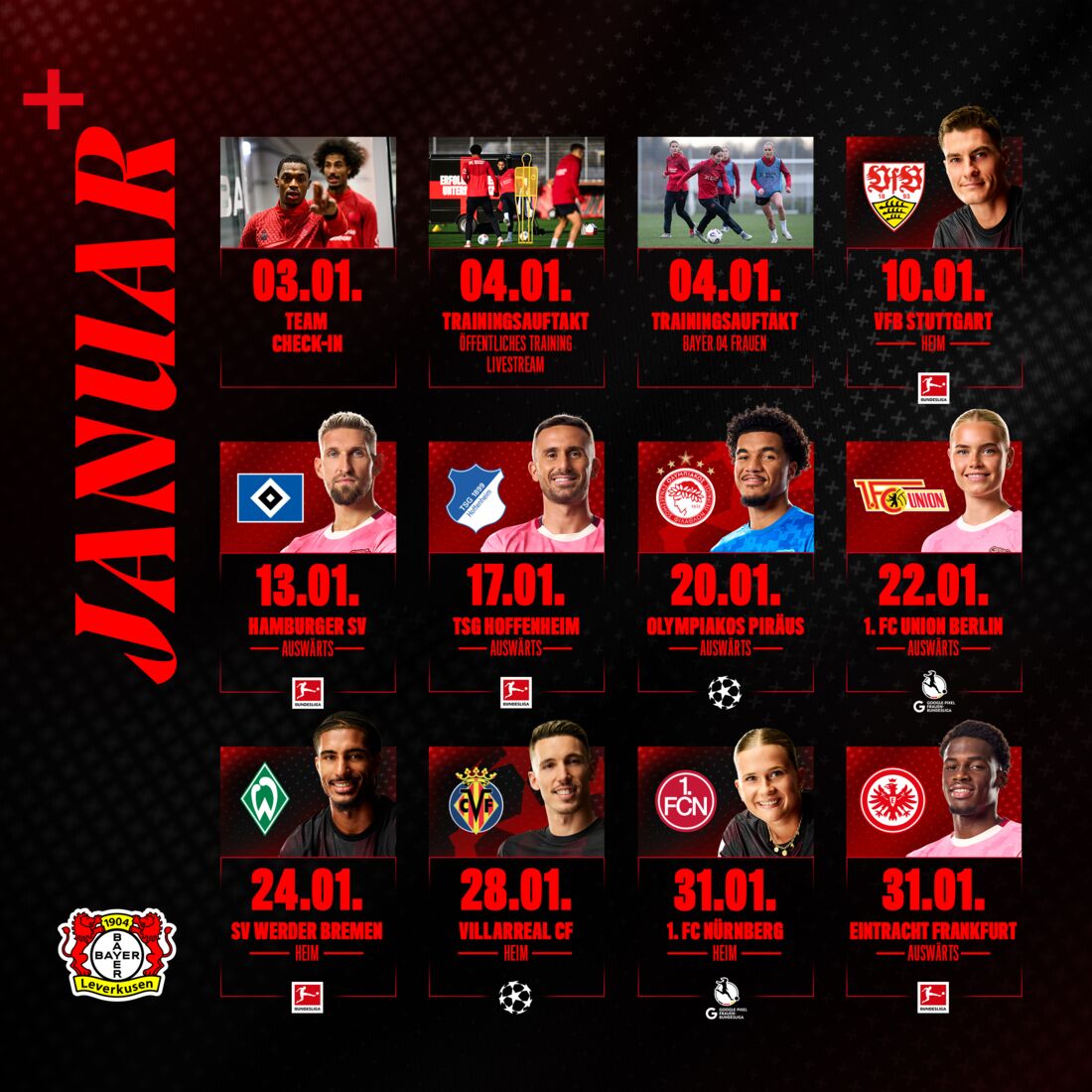
Bayer 04’s new year schedule: Open training session on 4 January
After a two-week winter break, the Werkself resume training on Sunday, 4 January. The first session in 2026 at the Ulrich Haberland Stadium starts at 11:00 and is open to fans. Bayer 04 look forward to welcoming supporters at the start of 2026. The Werkself schedule for the new year.
Show more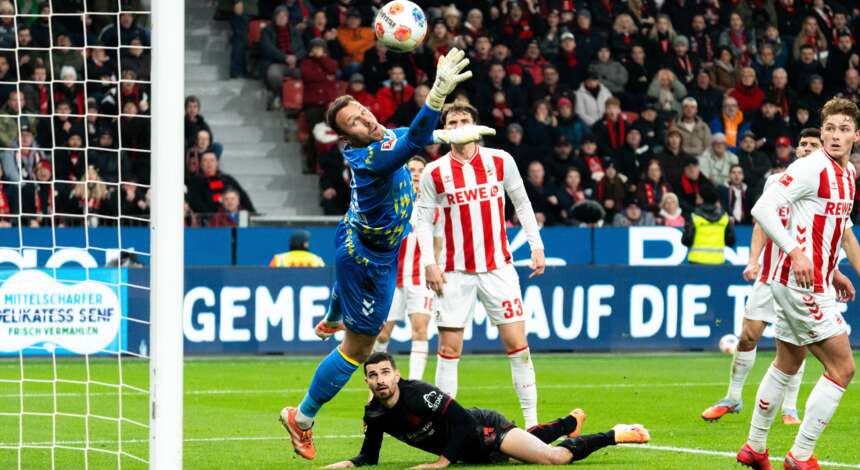
December Goal of the Month: Vote now for Martin Terrier!
After being nominated for the Bundesliga Goal of the Year 2025, Martin Terrier's wonderful strike for the opener against FC Köln is now also up for selection for the ARD Sportschau Goal of the Month award for December 2025. Bayer 04 fans have until 19:00 CET on 10 January to vote for the French forward.
Show more